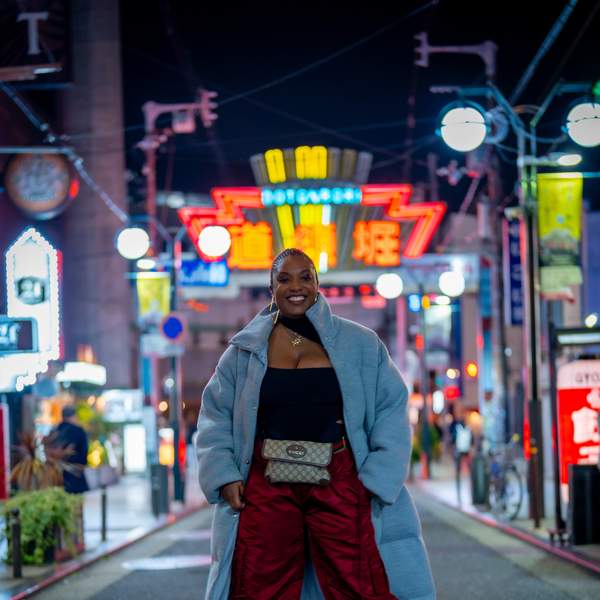Japan was never on my bucket list for places to travel. That was until I came across a Delta Airlines Premium Select seat for $1400. With the average flight in that cabin costing over $3,500, carving out a month-long solo travel trip was a no-brainer for me as a freelancer who can work from anywhere in the world.
Having traveled internationally at a consistent cadence over the last three years to countries like Portugal, France, Belgium, and the UK, one thing I know for sure is that anti-Blackness exists everywhere—whether this shows up as a microaggression or in a more aggressive form. It's not every day you're at a Beyoncé concert in Brussels and have a white man pushing you in Club Renny because he feels he's entitled to manspread and make you take up less space as a Black woman sings about her Black pride. Thankfully, I got a redo in Cardiff, Wales, with a crowd that wasn't entirely white.
Belgium, like Japan, is always on the list of the safest countries in the world. But the primary question is for whom? So I banked my previous experience in "one of the world's safest countries" as I prepared for my 18-hour flight to East Asia. Just off the plane and out of customs, I was overwhelmed. No amount of research can prepare you to navigate a new place where you don't speak or read the language in real time. For example, I knew I could withdraw Yen with my debit card from 7/11 ATMs without fees, but where on earth were they in this airport? Finding one was significant because Yen was required to purchase a ticket to take the monorail from Haneda to the city.
Thankfully, a local woman saw how frazzled I was and guided me to an ATM right next to where you purchase train tickets and helped me get in the right line. I was sweaty, tired, and so grateful. Why not just take a cab? For $90 USD one-way, I think not.
Like public transit anywhere, people have places to be, so navigating the station felt like being in New York City. However, there was a major difference: you could hear a pin drop. People do not talk on the train. No really. The trains were like being in the library, which was kind of nice. After fighting for my life and lugging my giant luggage through the train station, I hailed a black cab to take me the rest of the way. When I stepped out of the cab onto the Conrad Tokyo property, my five-star luxury journey began.
Now that I'm in my late 30s, where I stay matters. I'm not staying in a hostel. I'm not staying anywhere with questionable reviews. I'm not sharing a stranger's home. There's a lot of discourse about how "wasteful" it is to pay for five-star accommodations if you're in the country or city to explore—a fair point.
However, I'm not home. I want turndown service. And the turndown service in Japan takes it up a notch, laying out a fresh pair of perfectly pressed pajamas each night for you. Yes, please! And there was the butler box at The St. Regis Osaka, where I could send out my laundry and have it washed, neatly folded, and returned to me without ever having to speak to anyone. It magically appeared in the box I initially thought was a tiny closet! My butler also brought me my cappuccino at the same time I'd requested every day.
To have an exceptional meal or cocktail without leaving my hotel, especially after a long day of exploring or after 18 hours into a time zone that's 14 hours ahead, the ability to rest in what feels like a haven away from home is an unmatched act of self-care and worth every penny to me. However, as a Black traveler, these spaces don’t always feel welcoming, especially when one is young, a woman, and traveling solo. I often get "How is she staying here?" energy across countries, including in the States.
I stayed at four five-star hotels—the Conrad Tokyo and Osaka, the St. Regis Osaka, and The Okura Tokyo—with perks thanks to my American Express Platinum Card. The care I received made me feel safe and queen-like, which should be expected when staying in luxury accommodations. Yes, it should be. However, there have been moments at similar places where I couldn't wait to check out and wished I'd never spent my money.
My introduction to Japanese culture and hospitality started on a high note, and I quickly did everything I could to learn the customs. For example, bowing is customary when saying goodbye. As an American, this was a welcomed adjustment because it felt like an extension of my gratitude for the care I received.
I also had help from the staff learning a few words at my glorious sushi meal at Kazahana, a fine-dining Japanese restaurant nestled right downstairs in the hotel, as I desperately fought to stay awake on my first day in Tokyo. As I worked my way from a five-star hotel to a five-star hotel, how I was treated remained the same across the board. I found this surprising. But eventually, I let myself enjoy every second without questioning it.
Vintage shopping was high on my list of things to do in Japan because they are known for their exceptional finds that are often in mint condition at fair prices. I intended to purchase a Prada bag, but Chanel continued calling my name. I've shopped for designer luxury across countries. My absolute best shopping experience was Gucci at Harrods in London.
But because Japan isn't nearly as diverse, I was sure I might bump into some side eyes as I slid into the vintage shops with Fendi, Gucci, Hermes, Chanel, and any other designer brand you can think of taking up every square space of the store—many untethered to any security.
Kindal in Kyoto and Hedy in Osaka became my two favorites as I weaved in and out of multiple vintage stores in Tokyo, Kyoto, and Osaka—there are hundreds. Unlike many of TikTok's famed vintage shops, these stores were small and well-curated, and the customer service was full of kindness. For example, when I walked into Kindal, a stylish man with a blue fuzzy sweater greeted me. I pulled out one of the few Japanese words I knew: Konnichiwa, to which he smiled and came around the counter to give me the rundown of the store with the help of Google Translate.
He gratuitously walked me through trying each Chanel piece I was interested in, answering all my questions about the year, and encouraging me to walk to the mirrors in the store to see how each bag and piece of jewelry looked on me without hovering. Because of his help, I landed on Chanel Classic Flap and took an hour-long trek back to Kindal a week later to purchase a pair of Chanel earrings I loved but decided to put back on my first shopping trip because of how much I enjoyed my shopping experience with him.
In the wild (outside of my five-star hotels), stares happened occasionally. However, most often, I think there was either pure curiosity or because I had on my giant Brandon Blackwood coat, dark sunnies, and platform Nike sneakers that made me about six feet tall because of my 5 '8'' frame. Most people I talked to either complimented me on my style or cornrows, and no one ever tried touching my hair. So the leering were stares of endearment. I think...
As I ventured into the countryside, I swapped my five-star hotels for four-star ryokans. Ryokans are traditional Japanese inns that often serve half-board, aka breakfast and dinner with your stay. I wondered if I'd be accepted with open arms. But I was so excited about the onsens—natural hot springs sourced with water from volcanoes —that I just accepted my fate.
The same level of care was extended from the Ryokan staff to the small coffee shop I visited to work in Nara, where I was greeted daily with a smile despite a significant language barrier. What I found remarkable about supporting NORR coffee roasters is that the owner noticed how often I popped in and thanked me for coming back three days in a row. Little did he know, I kept coming back because it felt like home.
On my final trek through Japan from Nara to Gifu—the mountains of Japan—which required three trains and a bus ride with a total travel time of six hours one way, I knew that seeing anyone who looked like me was out. I wondered if they'd ever come in contact with a Black person and what that would spell out for my experience in the snowy mountains for five days.
What if I got up there and felt unwelcome? Guess what? That did not happen. The stares came from the white backpackers—never from the staff.
The one throughline of my trip was the care the Japanese women showed me from Tokyo to Takayama.
Thirty days is a long time to be so far away from home alone, and because of their attentive care, I got through my month-long trip with barely any homesickness. They all cared for me like I was one of their own. At one point at the Conrad Osaka, I got choked up because I was going to miss each person who graciously welcomed and took care of me during my stay.
As for walking around solo, I felt safe—more safe than I’ve ever felt in America, which is so disappointing. I was still alert, but I felt a sense of calm. I was generally always home before the streetlights came on, but on the nights I did walk, I stayed close to other people and had no issues.
One thing to note, that I’m grateful I didn’t experience, is the issue the country has with groping on public transport. There are even women-only train cars to help prevent this. As someone who has experienced sexual assault, I do find it difficult to be in small, crowded spaces filled with men. And, during rush hour, you will likely find yourself in the minority as a woman on the train.
To offset this, I used the women-only cars. I also took the limited express trains, which aren’t only a plus because you reserve your seat in a two-two configuration, but they’re so much faster since they don’t stop at every station. There is an additional fee on top of the base fare for this, which you can easily pay for on your phone, but it’s usually between 500 and 600 yen. This was worth it to me for more space and peace of mind.
Traveling while Black can be a toss-up because of how people see us. And, while I know there is no perfect society or country, the respect, care, and gratitude I received from the Japanese people I had the pleasure of getting to know put Japan at the top of my list for Black women who travel solo. The care I received extended from Starbucks to the drugstores. So, this isn’t just a five-star thing. It’s embedded in Japanese culture.
So, if you're considering booking a trip to Japan, I highly encourage you to book that flight!
Let’s make things inbox official! Sign up for the xoNecole newsletter for love, wellness, career, and exclusive content delivered straight to your inbox.
Featured image courtesy of Bianca Lambert
- I Got My Life After Trying A French Resort...In Jamaica ›
- Everything I Did On My Solo Trip To Oahu ›
- The Return Of The Supper Club Served With A Side Of Black Girl Magic ›
- How Evita Robinson Of Nomadness Tribe Is Pioneering The Black Travel Movement ›












